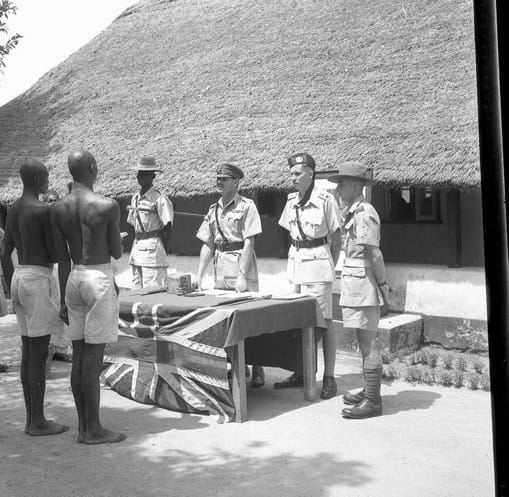Demands and Supplies
Edgar got his orders for East Africa where many Rhodesians and South Africans were serving. But two days later, he was switched to West Africa because a certain Peer of the Realm, had refused to go to West Africa and used influence to get transferred to East Africa.

Edgar said, "I've no experience of West Africa. I'll be less useful there."
"The matter's settled."
He entrained for Glasgow on October 27, 1940 in the middle of an air raid. In the first draft there were twenty-eight R.A.S.C. Officers and about fifty-six N.C.O.'s. None of them had been to West Africa before.
In Glasgow, they embarked in a large convoy, with most of the ships en route for the Middle East. Edgar was in a very old Orient liner which had been an armed merchant cruiser in WWI. Twelve great ocean liners ahead crept down the Clyde dead slow with their decks packed with some thirty thousand troops. The shipyard workers shouted "Give 'em hell boys."
That night, in the lower reaches of the river, they got into seagoing formation and sailed for Freetown.
They landed on the Gold Coast at Takoradi in mid-November. Soon many were laid low with malaria. Edgar found himself at times in charge of the entire administrative work for the whole of the R.A.S.C. enterprise in the Gold Coast. (R.A.S.C. was responsible for land, coastal and lake transport, air dispatch, barracks administration, supply of food, water, fuel, domestic materials and technical and military equipment.)
The first priority was to ensure resistance to invasion by the superior forces of Vichy.
The second was to provide a secure base for Navy and R.A.F. action guarding the main convoy route to the Middle East operating off the coast.
The third was to support the Free French colonies to the East and South of Nigeria to make sure they did not fall under Vichy control.
The fourth priority was to ensure that the economic resources of West Africa were always available for the Allies. The maintenance of the fat ration for the British public then depended on ground nuts, palm oil and other oil seeds of West Africa. In minerals: Nigerian tin, Sierra Leone industrial diamonds, Gold Coast bauxite and manganese all became important as the war continued. These all became enormously more important after the loss of Malaya and the Netherlands East Indies to the Japanese.
Most importantly, they were to supply three thousand African troops as R.A.S.C. personell capable of making a useful contribution to active theaters in the war within three months of arrival.
General Headquarters (G.H.Q.) laid down an army ration scale for African troops which could be purchased in the local markets. However, there were insufficient cattle on the Gold Coast so they began to import meat from Nigeria for slaughter. This gravely hampered coastal shipping and contributed to the expansion of submarine warfare in West African waters. Increased English personell exacerbated the problem further because they were deeply suspicious of any exotic food and demanded English fare.
The full Colonel commanding the R.A.S.C. throughout West Africa rang Whitehead, "The Brigadier has decided sausages must be produced for the English troops. I need a sample sent at G.H.Q."
"Yes, Sir."
"How do you propose to go about it?"
"I'll have an answer tomorrow."
Edgar conferenced with the Medical Officer and the Senior R.A.S.C. butcher. There were no sausage skins available. They manufactured these from sheep's gut bought from the African market. The gut was inflated in the M.I. workshop with power pumps and the M.O. carefully sterilized it so at least nobody could be poisoned. They added a good proportion of bread crumbs. Finally the R.A.M.C. master butcher produced an article that looked like a sausage. It was passed as hygienically safe by the M.O.
Edgar sent his sample to the full Colonel at G.H.Q. with a short note: 'This is the best we can improvise at short notice.'
The next morning after breakfast, the Colonel rang from H.Q. "That you Whitehead?"
"Yes, Sir."
"Those sausages! I have just eaten two. They're bloody awful!"
"Yes sir."
"But they are sausages, go on and issue them."
The historical novel Whitewashed Jacarandas and its sequel Full of Possibilities are both available on Amazon as paperbacks and eBooks.
These books are inspired by Diana's family's experiences in small town Southern Rhodesia after WWII.
Dr. Sunny Rubenstein and his Gentile wife, Mavourneen, along with various town characters lay bare the racial arrogance of the times, paternalistic idealism, Zionist fervor and anti-Semitism, the proper place of a wife, modernization versus hard-won ways of doing things, and treatment of endemic disease versus investment in public health. It's a roller coaster read.
References:
- Sir Edgar Whitehead's Unpublished Memoirs, Rhodes House, Bodleian Library, Oxford University, by permission.
- Photo Credit: https://x.com/NigeriaStories/status/1523250947438579712/photo/1
- See My Father and the Forgotten Army. Documentary on BBC 2 https://bleaseworld.blogspot.com/2013/07/burma-my-father-and-forgotten-army-and.html

